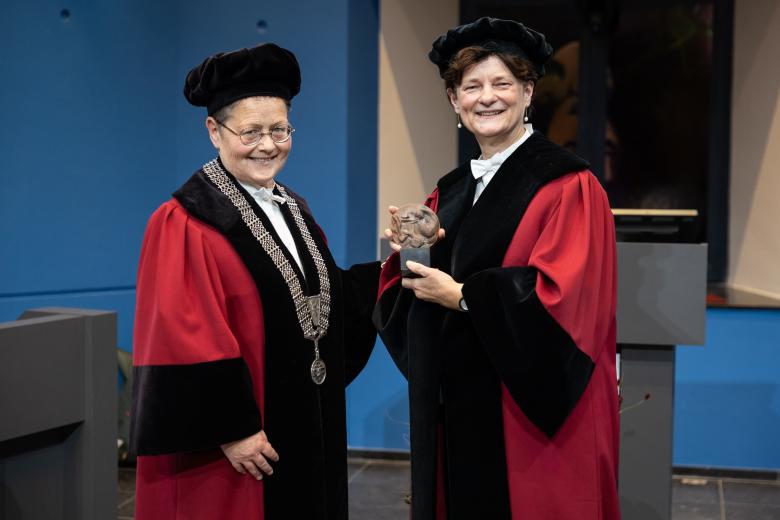Esther Heuts - Director of Education for Medicine
As a clinician, educationalist and mother of three teenagers, Esther Heuts understands the constantly evolving world of students and doctors. From this academic year, Esther will draw on that knowledge in her new role as Director of Education for Medicine. She regards the renewed Medicine curriculum and the changing regional needs for medical specialists as her first challenges. The most important goal of the position is taken over from the team behind the programme: students graduating with passion for the profession and with a clear sense of who they are and what they stand for.
Esther’s clinical passion is breast cancer. Since 2010, she has been working at MUMC+ as a surgeon specialising in breast cancer care. She chose an academic hospital because she sees herself as an academic doctor. Esther explains: “In the sense that I enjoy the combination of teaching, research and patient care. In the hospital I work as a surgeon, but for many years I was educational coordinator for surgery, and I teach a wide range of students from our Medicine programme.” To strengthen her expertise in education, Esther also completed the Master in Health Professions Education at the School of Health Professions Education (SHE).
She Collaborates
That step opened the door to SHE Collaborates. “Earlier this year, I travelled to Sierra Leone for an education project to train local teachers. The midwifery students there were sitting in classrooms two to a desk, just as we remember from secondary school. SHE Collaborates provides support and training to improve the way education in healthcare is delivered.”
Bridging the worlds of healthcare and education
Eventually Esther was given the opportunity to contribute to education within her own university. “Working as a clinician and as a Director of Education for Medicine is a logical combination. A large part of medical education is carried out in collaboration with healthcare professionals in the workplace. As a lecturer, I have expertise in the field, and also personal contact with the educational experts within our faculty who shape the Medicine curriculum. That interaction ensures that both elements strengthen each other and form a valuable whole for this role.”
For example, we have the General Practitioner placement, and we continue to demonstrate that UM performs well as an innovative educational institution.
Proud of Maastricht University
As Director of Education, Esther is a central figure connecting lecturers, students, the Directors of Education for Biomedical Sciences and Health Sciences, the hospital, and even politics. “We have to meet the national demand for medical specialists. At the moment, for example, there is a shortage of doctors in outpatient care. Together with my team, I consider how we can address this, without losing sight of the students who, during their studies, need to find their path to a specialty that continues to give them fulfilment.”
From one of the first meetings Esther attended with the other Dutch Directors of Education in Medicine, it became clear that Maastricht University is a frontrunner in this area. “For example, we have the General Practitioner placement and continue to demonstrate that UM performs well as an innovative educational institution. Problem-Based Learning and programme-based assessment are our own innovations that are now finding their way worldwide. We can be proud of that.”
New Medicine curriculum
The latest innovation is the new curriculum for the Bachelor of Medicine, which revolves around Authentic Professional Tasks. Students are given the time to acquire the knowledge and skills needed to complete a task. They track their progress in a portfolio, which is assessed at the end of the year.
“When students start their Medicine degree in Maastricht, they are usually accustomed to traditional teaching: studying the assigned chapters, taking a test, and receiving a grade. In the first weeks of our Medicine programme, students need to get used to the new teaching methods. By the time they have completed the programme, they have developed an understanding of who they are, what they want to become, and their approach to life. This development, from first-year student to graduate as a young doctor of the future, is the goal of our programme. For me, it is a rewarding and meaningful task to contribute to this process.”
Text and photography: Ruben Beeckman
Also read
-
Prof. dr. Mirjam oude Egbrink awarded MUMC+-medal
During her farewell lecture on Friday, 28 November, Prof. Mirjam Oude Egbrink was awarded the MUMC+ medal by Dean Annemie Schols for her distinguished career.
-
More than a student job: five alumni about their unique role in groundbreaking vascular research
What is it like to take part in cutting-edge vascular research as a student, standing in the operating room, directly responsible for handling patient material? Five alumni of the Maastricht MAPEX student team share what they learned, the challenges they faced, and how this experience shaped their...
-
Sophie Jooren - Compliance to local tobacco policies
Whether a specific intervention to create a smoke-free outdoor environment is effective or not has been widely studied. However, to improve compliance, policymakers need to understand how smokers react to those interventions and the factors influencing their compliance.